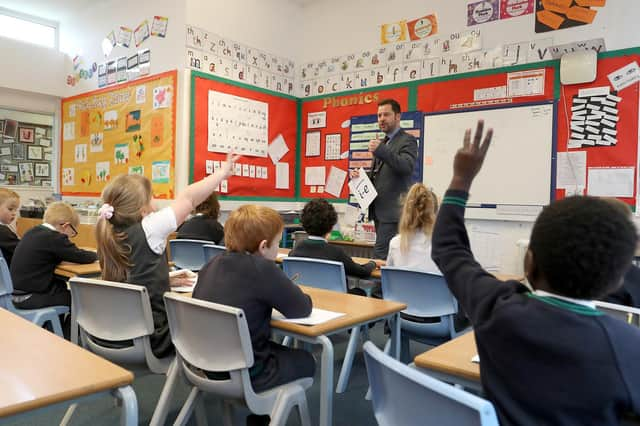Covid vaccines approved for vulnerable UK primary school children aged five to 11


It follows the Medicines and Healthcare products Regulatory Agency (MHRA) giving its approval for a new age-appropriate formulation of the Pfizer BioNTech COVID-19 vaccine.
The MHRA that it is safe and effective following "a robust review of safety data that shows a positive benefit-risk profile for this vaccine to be used in this age group".
Advertisement
Hide AdAdvertisement
Hide AdIt will be given at a lower dose compared to that used in individuals aged 12 and above (10 micrograms compared with 30 micrograms). As with other age groups, it is given as two injections in the upper arm.
The JCVI has currently stopped short of saying all primary school children should receive the vaccine, instead advising that it should be for those are in a clinical risk group or who are a household contact of someone (of any age) who is immunosuppressed.
It will be given as two doses, eight weeks apart.
The JCVI said further advice regarding a wider rollout of Covid vaccines for primary school children "will be issued in due course following consideration of additional data relevant to this age group, and on the Omicron variant more broadly".
Professor Wei Shen Lim, Chair, COVID-19 immunisation, JCVI said: “The majority of children aged 5 to 11 are at very low risk of serious illness due to COVID-19. However, some 5 to 11 year olds have underlying health conditions that put them at higher risk, and we advise these children to be vaccinated in the first instance.
Advertisement
Hide AdAdvertisement
Hide Ad“For children and young people who have completed a primary course of vaccination, a booster dose will provide added protection against the Omicron variant.”
The JCVI has also recommended that 16 and 17-year-olds are offered booster vaccinations, along with 12 to 15-year-olds or who in a clinical risk group or who are a household contact of someone (of any age) who is immunosuppressed. Those aged between 12 and 15 who are severely immunocompromised will be offered a fourth dose.
Dr June Raine, MHRA Chief Executive said: “Parents and carers can be reassured that no new vaccine for children would have been approved unless the expected standards of safety, quality and effectiveness have been met.
“We have concluded that the Pfizer/BioNTech COVID-19 vaccine is safe and effective for 5 to 11-year olds, with no new safety concerns identified. We have carefully considered all the available data and reached the decision that there is robust evidence to support a positive benefit risk for children in this age group.
Advertisement
Hide AdAdvertisement
Hide Ad“Our detailed review of all side-effect reports to date has found that the overwhelming majority relate to mild symptoms, such as a sore arm or a flu-like illness. We have in place a comprehensive safety surveillance strategy for monitoring the safety of all UK-approved COVID-19 vaccines and this includes children aged 5 to 11 years old.”
The MHRA said it had liaised with other international regulators and public health bodies to come its decision, with the data showing "a favourable safety profile compared with that seen in other age groups".
More than 5.5 million dosages of the vaccine in this age group have now been administered in the US alone.
Read more:
Advertisement
Hide AdAdvertisement
Hide AdSupport The Yorkshire Post and become a subscriber today. Your subscription will help us to continue to bring quality news to the people of Yorkshire. In return, you'll see fewer ads on site, get free access to our app and receive exclusive members-only offers. Click here to subscribe.
Comment Guidelines
National World encourages reader discussion on our stories. User feedback, insights and back-and-forth exchanges add a rich layer of context to reporting. Please review our Community Guidelines before commenting.